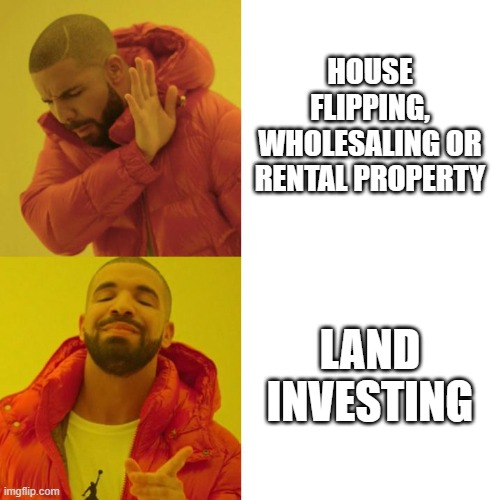
As you probably know, our little secret niche of land investing has a lot of opportunity
But not a lot of people know about it…so anyone interested in real estate looks to invest in houses and other more traditional forms of real estate.
While land investing may be a secret, I think we can both agree that anyone in real estate gets into it to make a profit.
But, if the avg person did some numbers on a SFR (single family residence\rental) they may see that its not what its cracked up to be.
Let do some back of the envelope math here:
I might buy a house to rent out for $400,000.
I’ll invest $100,000 of my cash for the down payment plus another $10,000 for closing costs.
With a mortgage rate of 7.5%, my total monthly payment (including taxes and insurance) will be about $2,600.
The most rent I’ll be able to get will be about $2,100.
I’ll have to make up the $500 shortfall from my other income each month.
So far, this isnt looking so good, but lets keep going.
Part of each payment will repay the loan—about $220 in the early years—so now the shortfall is “just” $280.
And that assumes there are no additional expenses (read: repairs!) and that the tenant pays the rent every month.
If I have to replace an appliance or unclog a drain, that comes from my pocket.
But let’s say I luck out and just have to pay an average of $100 each month for repairs and maintenance.
Now I’m contributing $380 monthly plus the money I pay toward the principal.
I’m writing a check for about $600 each month to provide a tenant with a place to live.
Now, if you are real estate savvy, you might respond with something like, “Yeah, but look at all the write-offs you get!”
Fair enough.
Income-producing real estate allows the owner to depreciate the improvement (the building, not the land).
If the structure is worth $275,000, I’ll have $10,000 to write off each year and other expenses.
When I file my income taxes, I’ll list all my income and expenses (including depreciation).
I’ll show a loss of $14,500 for tax purposes.
Assuming I am actively involved in the management of the rental, I can use that to offset my other income.
Depending on my other income, that tax loss is probably worth about $3,000 in reduced income taxes to me—$250 a month.
Now it’s close to a break-even investment.
Not bad…until you remember the reason why we get into real estate…
So, let me ask you this: If you had $100,000+ to invest in something, would you be happy with a zero return?
I’m guessing you wouldn’t.
Neither would I.
I’m hoping the property will appreciate—go up in value.
If the house I paid $400,000 goes up by 4% a year—and remember, nothing is ever guaranteed—it’ll be worth about $485,000 in five years.
My equity will have grown from $100,000 to about $183,000.
That looks a lot more attractive.
But keep in mind that I have had to write a check each month to keep the lender from foreclosing on my investment.
If that tenant falls behind on the rent, I’m still on the hook for the payment.
I may also have to deal with the occasional plugged toilet or furnace that stops working.
Owning a rental house is by no means a “set it and forget it” investment.
I didn’t invest six figures in this house out of the goodness of my heart—although I am very happy to provide a safe, comfortable space for you to live in.
I invested because I expected to make a profit.
However, not only is this a lot of work, but my profit is delayed and not that great compared to land.
The way I invest in land, 100k can get me 300k in returns.
Not to mention I wont have to deal with tenants or evictions, or people late on rent or repairing leaky sink.
Look, land investing has its pros and cons like everything else…
but looking at the alternatives, I will happily stick with land investing.
If you agree with me, but you need a way to get start, stay tuned, my gift to you is almost ready!
I promise it will be unlike anythging else you have seen in this space.